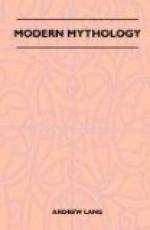Now no member of the reading public, perusing Mr. Max Muller on anthropological evidence (i. 24-26, 205-207), could guess that his cautions about evidence are not absolutely new to us. He could not guess that Dr. Tylor replied to them ‘before they were made’ by our present critic (I think), and that I did the same with great elaboration. Our defence of our evidence is not noticed by Mr. Max Muller. He merely repeats what he has often said before on the subject, exactly as if anthropologists were ignorant of it, and had not carefully studied, assimilated, profited by it, and answered it. Our critic and monitor might have said, ’I have examined your test of recurrences, and what else you have to urge, and, for such and such reasons, I must reject it.’ Then we could reconsider our position in this new light. But Mr. Max Muller does not oblige us in this way.
Mr. Max Muller on our Evidence
In an earlier work, The Gifford Lectures for 1891, {96} our author had devoted more space to a criticism of our evidence. To this, then, we turn (pp. 169-180, 413-436). Passing Mr. Max Muller’s own difficulties in understanding a Mohawk (which the Mohawk no doubt also felt in understanding Mr. Max Muller), we reach (p. 172) the fables about godless savages. These, it is admitted, are exploded among scholars in anthropology. So we do, at least, examine evidence. Mr. Max Muller now fixes on a flagrant case, some fables about the godless Mincopies of the Andaman Islands. But he relies on the evidence of Mr. Man. So do I, as far as it seems beyond doubt. {97a} Mr. Man is ’a careful observer, a student of language, and perfectly trustworthy.’ These are the reasons for which I trust him. But when Mr. Man says that the Mincopies have a god, Puluga, who inhabits ‘a stone house in the sky,’ I remark, ’Here the idea of the stone house is necessarily borrowed from our stone houses at Port Blair.’ {97b} When Mr. Man talks of Puluga’s only-begotten son, ’a sort of archangel,’ medium between Puluga and the angels, I ’hesitate a doubt.’ Did not this idea reach the Mincopie mind from the same quarter as the stone house, especially as Puluga’s wife is ’a green shrimp or an eel’? At all events, it is right to bear in mind that, as the stone house of the Mincopie heaven is almost undeniably of European origin, the only-begotten mediating son of Puluga and the green shrimp may bear traces of Christian teaching. Caution is indicated.
Does Mr. Max Muller, so strict about evidence, boggle at the stone house, the only son, the shrimp? Not he; he never hints at the shrimp! Does he point out that one anthropologist has asked for caution in weighing what the Mincopies told Mr. Man? Very far from that, he complains that ’the old story is repeated again and again’ about the godless Andamans. {97c} The intelligent Glasgow audience could hardly guess that anthropologists were watchful, and knew pretty well what to believe about the Mincopies. Perhaps in Glasgow they do not read us anthropologists much.




